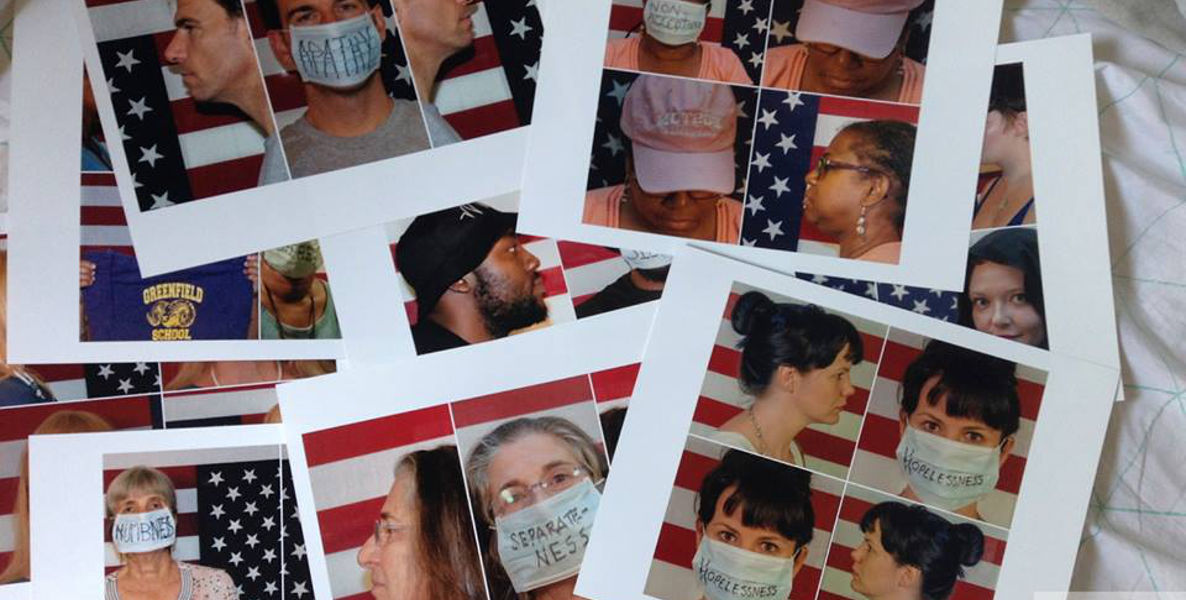Like millions of others around the world, Germantown photographer Tieshka Smith watched the video last summer of a pool party in McKinney, Texas, in which a white police officer restrained an unarmed 15-year-old girl on the ground and later drew his gun. It was the latest in a series of police violence cases over the past few years. And like so many others, Smith was angry, hurt and confused.
So Smith, a Chicago native who has been taking photographs for years, turned to her craft, for a series of projects that make up “Racism Is A Sickness” at the Ethical Society this month. “I needed to do something to help me deal with the emotions,” Smith says. “I wanted to use that anger and turn it into something positive.”
She decided to create a photography series in which she interviewed 14 Philadelphians of a variety of races, ages, and genders about their relationship to race—their early formative experiences, their struggles talking about it, their hopes and fears. She purposely chose about half white subjects to interview. Then she shot them in front of an upside down American flag wearing surgical masks with a word—like numbness, arrogance, willful arrogance—describing how they see racism.

“I was really concerned and curious about what I perceived to be this overwhelming silence among my white friends—where are they on this? Do they know? Do they care?” says Smith, who is African American. “I wanted to really engage people I know who are white who I care about. I know that they had feelings about what was happening, too, but either didn’t know how to talk about it or were afraid of being judged.”
Their responses, like candid admissions of fear and hopelessness and apathy, were so rich and complex that Smith couldn’t stop with photographs. She created sculptures out of mannequin heads decoupaged with clippings from newspaper stories that chronicled police violence and political divisions that represent what Smith feels it means to live in America today. She also started an ongoing mixed media piece called “Death By A Thousand Cuts,” with fake dollar bills, to represent the financial cost—in trials, settlements, lawsuits and more—that taxpayers bear because of police violence. Visitors to the exhibit have added bills, with the names of people they know who have been affected by police brutality. Smith says the piece will be completed when it is full enough to serve as the backdrop for another piece of art in future.
“We could be doing much better things with our tax dollars than paying families that shouldn’t have been harmed in the first place,” Smith says. “We really need to rethink how we’re dealing with the backend of police brutality.”
To Smith, the exhibit is not just about the end result. It’s also a process. Throughout, visitors are offered the opportunity to have their say about racism. On a comment board, viewers have noted that racism also occurs within the black community, and about phobia from both white and black communities towards bi-racial people. Smith has pasted questions to the wall like, “If there was one aspect of racism I could heal/eliminate it would be…” Hundreds of viewers have grabbed post-its from nearby to write their responses, like “disrespect, passed on through generations,” “denial,” “self-hatred,” and “I would eliminate lies about racism.” Together, they create a multicolored word cloud that Smith also plans to incorporate into future pieces.

“The goal for me is to get people to talk about their own feelings of racism and create a safe space for people who really don’t know how to engage in the conversation about racism to start to talk to each other and to themselves,” says Smith. “The art really happens when the community comes and engages with the exhibit. I want to move the conversation away from tragedy and towards healing. I want us to start talking about the question, what do we need to do to help people heal from the effects of racism?”
Now through June 24, Philadelphia Ethical Society, 1906 S. Rittenhouse Square.




